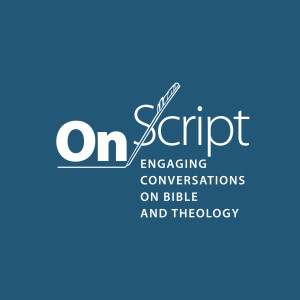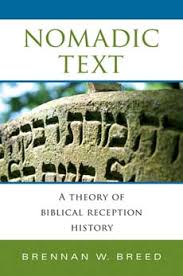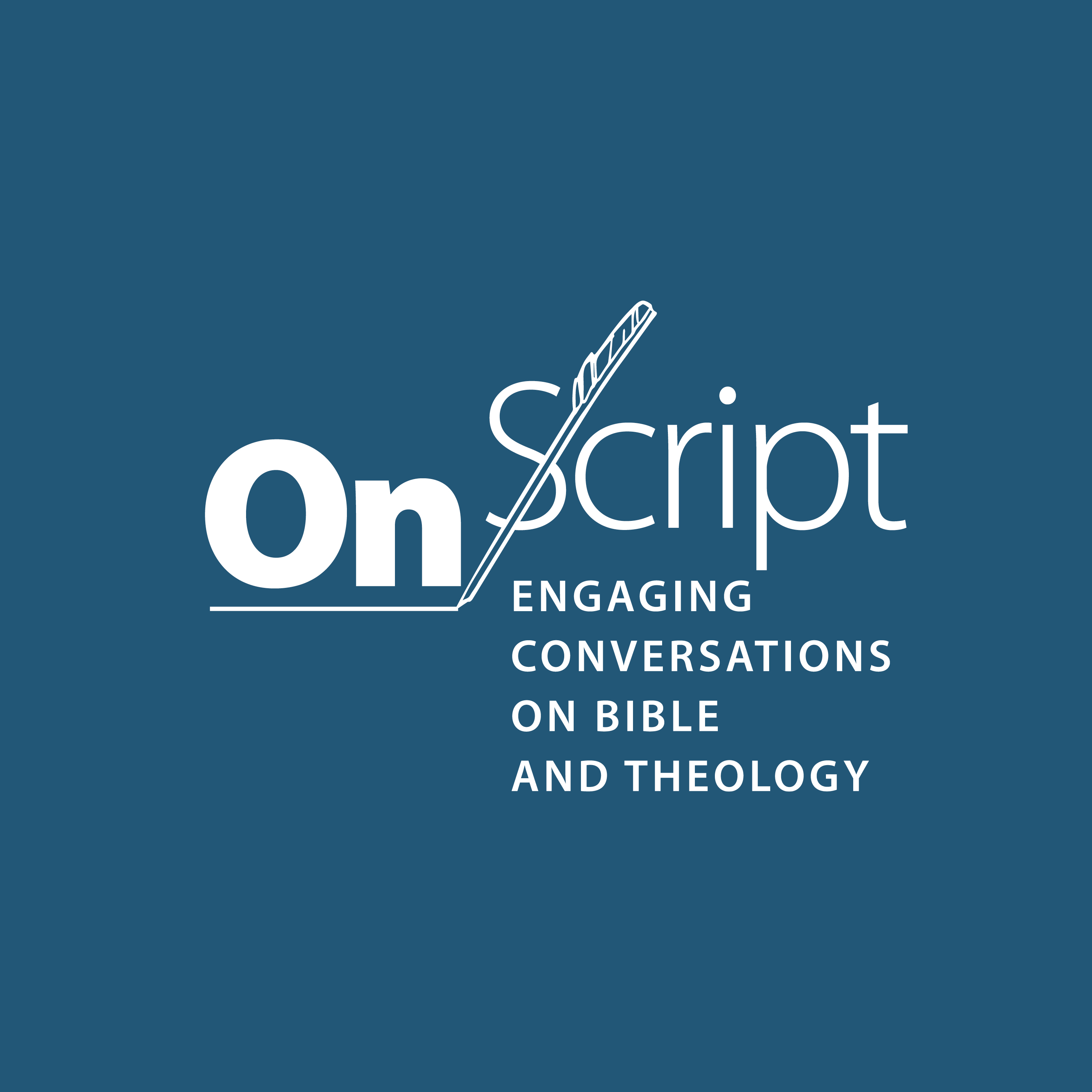Episodes

Monday Aug 15, 2016
Alison Joseph – Portrait of the Kings
Monday Aug 15, 2016
Monday Aug 15, 2016
 Episode: Take a journey into the heart of the Deuteronomist to discover more about the king after God’s own heart through the eyes of the book of Kings. Matt Lynch interviews Alison Joseph about her Manfred Lautenschlaeger award-winning book Portrait of the Kings. As an intro bonus to this episode Matt gives a little 10-minute overview of the Deuteronomistic History, free of charge (but you can skip to get to the good stuff).
Episode: Take a journey into the heart of the Deuteronomist to discover more about the king after God’s own heart through the eyes of the book of Kings. Matt Lynch interviews Alison Joseph about her Manfred Lautenschlaeger award-winning book Portrait of the Kings. As an intro bonus to this episode Matt gives a little 10-minute overview of the Deuteronomistic History, free of charge (but you can skip to get to the good stuff).
Guest: Alison Joseph is a visiting assistant professor of Jewish Studies at Swarthmore College in Pennsylvania. She received the prestigious Manfred Lautenschlaeger Award for Theological Promise in 2016 for her work Portrait of the Kings. She earned her PhD in Hebrew Bible and Jewish Studies from the University of California, Berkeley. She also holds degrees from Emory University, the Jewish Theological Seminary, and Barnard College. She has taught at Haverford College, Towson University, Villanova University, the Jewish Theological Seminary, and Ursinus College.
Book: Alison’s Portrait of the Kings: The Davidic Prototype in Deuteronomistic Poetics is published by Fortress Press, 2016.  Her book examines the rich literary texture of Kings, especially the use of the Davidic ‘prototype’ and its ‘antitype’ in the figure of Jeroboam.
Her book examines the rich literary texture of Kings, especially the use of the Davidic ‘prototype’ and its ‘antitype’ in the figure of Jeroboam.
The OnScript Quip (our review): Alison Joseph’s Portrait of the Kings bridges a divide rarely crossed in biblical studies – the divide between literary and historical critical studies. Drawing inspiration from Robert Alter’s ‘type scenes’ and Frank Moore Cross’ double redaction hypothesis, Joseph observes the importance of the ‘Davidic prototype’ and its Jeroboam ‘anti-type’ in the book of Kings, where each king receives evaluation in terms of his relationship to David’s cultic loyalty. Oddly, David looks different in Kings than in Samuel, leading Joseph to ask, ‘Is David like David?’ Her answer is both creative and convincing, and offers further support for a thesis that the Deuteronomistic History’s first edition hit the shelves during the reign of Josiah, or thereabouts. — Matthew J. Lynch, Westminster Theological Centre, OnScript

Tuesday Aug 02, 2016
David J. Downs – Alms
Tuesday Aug 02, 2016
Tuesday Aug 02, 2016
 Episode: Martin Luther found the sale of indulgences objectionable, so he nailed 95 theses to the door of his bishop’s castle, launching the Protestant Reformation. But where did the idea that giving money could somehow alleviate the human sin problem originate? OnScript host Matthew Bates welcomes David Downs to discuss the biblical and systematic implications of atoning almsgiving. Interviewing from Tanzania (please forgive the occasional authentic Tanzanian background noise!), David’s reflections on charitable giving for the church today is multicultural and profound. His book Alms is certainly highly recommended. Listen. Share. Read.
Episode: Martin Luther found the sale of indulgences objectionable, so he nailed 95 theses to the door of his bishop’s castle, launching the Protestant Reformation. But where did the idea that giving money could somehow alleviate the human sin problem originate? OnScript host Matthew Bates welcomes David Downs to discuss the biblical and systematic implications of atoning almsgiving. Interviewing from Tanzania (please forgive the occasional authentic Tanzanian background noise!), David’s reflections on charitable giving for the church today is multicultural and profound. His book Alms is certainly highly recommended. Listen. Share. Read.
Guest: Dr. David J. Downs is Associate Professor of Biblical Studies at Fuller Theological Seminary. He holds degrees from Clemson, Fuller, and Princeton, having served as a teaching fellow at Princeton and a visiting professor at Holy Cross. In addition to Alms, David has also published The Offering of the Gentiles: Paul’s Collection for Jerusalem in Its Chronological, Cultural, and Cultic Contexts (Mohr Siebeck, 2008; repr. Eerdmans, 2016), as well as numerous journal articles.
 Book: David J. Downs, Alms: Charity, Reward, and Atonement in Early Christianity (Waco, Tex.: Baylor University Press, 2016). Christianity has often understood the death of Jesus on the cross as the sole means for forgiveness of sin. Despite this tradition, David Downs traces the early and sustained presence of yet another means by which Christians imagined atonement for sin: merciful care for the poor. Alms, in the end, illuminates the challenge of reading Scripture with the early church, for numerous patristic witnesses held together the conviction that salvation and atonement for sin come through the life, death, and resurrection of Jesus and the affirmation that the practice of mercifully caring for the needy cleanses or covers sin. Perhaps the ancient Christian integration of charity, reward, and atonement has the potential to reshape contemporary Christian traditions in which those spheres are separated.
Book: David J. Downs, Alms: Charity, Reward, and Atonement in Early Christianity (Waco, Tex.: Baylor University Press, 2016). Christianity has often understood the death of Jesus on the cross as the sole means for forgiveness of sin. Despite this tradition, David Downs traces the early and sustained presence of yet another means by which Christians imagined atonement for sin: merciful care for the poor. Alms, in the end, illuminates the challenge of reading Scripture with the early church, for numerous patristic witnesses held together the conviction that salvation and atonement for sin come through the life, death, and resurrection of Jesus and the affirmation that the practice of mercifully caring for the needy cleanses or covers sin. Perhaps the ancient Christian integration of charity, reward, and atonement has the potential to reshape contemporary Christian traditions in which those spheres are separated.
The OnScript Quip (our review): A broad yet deep study of the atoning power of merciful action in ancient Judaism, the New Testament, and early Christianity, Alms is beautifully written and persuasively argued. Deposit this book in your library’s treasury and generations of readers will be enriched. — Matthew W. Bates, Quincy University, OnScript

Tuesday Jul 12, 2016
Jon Levenson – The Love of God
Tuesday Jul 12, 2016
Tuesday Jul 12, 2016
EPISODE: Jon Levenson joins OnScript to discuss his recent book The Love of God (Princeton, 2016). Jon and Matt L. discuss how the concept of ‘love’ differed in ancient Israel, whether Song of Songs can/should be read allegorically, and how understandings of love developed and changed throughout history.
 GUEST: Jon D. Levenson is Albert A. List Professor of Jewish Studies at Harvard Divinity School. He is the author of numerous books, including Resurrection and the Restoration of Israel: The Ultimate Victory of the God of Life (Yale University Press, 2006), which won a prestigious National Jewish Book Award, and also the Biblical Archaeology Society Publication Award in the category of Best Book Relating to the Hebrew Bible published in 2005 or 2006. Choice, a publication of the American Library Association, listed his book Inheriting Abraham: The Legacy of the Patriarch in Judaism, Christianity, and Islam (Princeton University Press, 2012) as one of the Outstanding Academic Titles for 2013.
GUEST: Jon D. Levenson is Albert A. List Professor of Jewish Studies at Harvard Divinity School. He is the author of numerous books, including Resurrection and the Restoration of Israel: The Ultimate Victory of the God of Life (Yale University Press, 2006), which won a prestigious National Jewish Book Award, and also the Biblical Archaeology Society Publication Award in the category of Best Book Relating to the Hebrew Bible published in 2005 or 2006. Choice, a publication of the American Library Association, listed his book Inheriting Abraham: The Legacy of the Patriarch in Judaism, Christianity, and Islam (Princeton University Press, 2012) as one of the Outstanding Academic Titles for 2013.
 BOOK: The Love of God: Divine Gift, Human Gratitude, and Mutual Faithfulness in Judaism (Princeton, 2016) takes up one of the most significant yet perplexing themes in the Bible and Judaism. ‘Love’ in the Bible is a command, yet also involved emotions. It was part of the legal contract binding God and Israel, yet also an expression of the intimacy between them. How do these ideas fit together, and how did they develop and change? These are just a few of the significant themes Levenson discusses with characteristic brilliance and elegance.
BOOK: The Love of God: Divine Gift, Human Gratitude, and Mutual Faithfulness in Judaism (Princeton, 2016) takes up one of the most significant yet perplexing themes in the Bible and Judaism. ‘Love’ in the Bible is a command, yet also involved emotions. It was part of the legal contract binding God and Israel, yet also an expression of the intimacy between them. How do these ideas fit together, and how did they develop and change? These are just a few of the significant themes Levenson discusses with characteristic brilliance and elegance.

Tuesday Jun 21, 2016
Crispin Fletcher-Louis — Jesus Monotheism, Volume 1
Tuesday Jun 21, 2016
Tuesday Jun 21, 2016
 Episode: When speaking of Christian origins, what images and grammar could a first-century Jew use to say that Jesus of Nazareth was in some sense YHWH, the one God of Israel? And what might cause a Jew to say such a thing in the first place? Matthew Bates welcomes Crispin Fletcher-Louis to OnScript. Crispin’s exciting new book Jesus Monotheism offers a fresh theory of christological origins. Matt and Crispin navigate the so-called “early, high” christological theories of Larry Hurtado and Richard Bauckham. Crispin’s intensely incarnational model is stirring up some terrific conversation among biblical scholars and theologians–compelling all to reconsider how Adam, high priesthood, and divine identity connect to Christology. Join the conversation today.
Episode: When speaking of Christian origins, what images and grammar could a first-century Jew use to say that Jesus of Nazareth was in some sense YHWH, the one God of Israel? And what might cause a Jew to say such a thing in the first place? Matthew Bates welcomes Crispin Fletcher-Louis to OnScript. Crispin’s exciting new book Jesus Monotheism offers a fresh theory of christological origins. Matt and Crispin navigate the so-called “early, high” christological theories of Larry Hurtado and Richard Bauckham. Crispin’s intensely incarnational model is stirring up some terrific conversation among biblical scholars and theologians–compelling all to reconsider how Adam, high priesthood, and divine identity connect to Christology. Join the conversation today.
Guest: Crispin Fletcher-Louis studied at Keble College, Oxford under biblical studies luminaries such as E.P. Sanders, N.T. Wright, and Christopher Rowland. He has taught in the Theology and Religious Studies departments of King’s College, Durham University, and Nottingham University. He was also Resident Theologian and at St Mary’s Bryanston Square, a church in Central London.
 Book: Crispin Fletcher-Louis, Jesus Monotheism: Volume 1: Christological Origins: The Emerging Consensus and Beyond (Eugene, Or.: Cascade, 2015). Published simultaneously in ebook format by Whymanity at Jesus Monotheism.com. This is the first of a four-volume groundbreaking study of Christological origins. The fruit of twenty years research, Jesus Monotheism lays out a new paradigm that goes beyond the now widely held view that Paul and others held to an unprecedented “Christological monotheism”.
Book: Crispin Fletcher-Louis, Jesus Monotheism: Volume 1: Christological Origins: The Emerging Consensus and Beyond (Eugene, Or.: Cascade, 2015). Published simultaneously in ebook format by Whymanity at Jesus Monotheism.com. This is the first of a four-volume groundbreaking study of Christological origins. The fruit of twenty years research, Jesus Monotheism lays out a new paradigm that goes beyond the now widely held view that Paul and others held to an unprecedented “Christological monotheism”.

Tuesday May 31, 2016
Brennan Breed – Nomadic Text
Tuesday May 31, 2016
Tuesday May 31, 2016
AT A GLANCE: Relax in your Yurt and tune in as Brennan Breed joins us to discuss his recent book Nomadic Text: A Theory of Biblical Reception History (Indiana University Press, 2014). This episode is virtual road trip through the world of biblical studies, reception history, and beyond. Along the way, Breed discusses his run-in with a bear, theories about the end of the world, UFOs, and why he thinks biblical texts are more at home on the road.
GUEST:  Dr. Brennan Breed is Assistant Professor of Old Testament at Columbia Theological Seminary in Decatur, Georgia. In addition to his recently authored Nomadic Text, Breed contributed reception-historical commentary for the Old Testament Library Daniel commentary by Carol Newsom (WJK Press, 2014). Breed’s research interests also include Hebrew poetry, biblical theology, textual criticism, ancient and medieval visual art, and philosophy. He is currently working on an Ecclesiastes commentary with Davis Hankins.
Dr. Brennan Breed is Assistant Professor of Old Testament at Columbia Theological Seminary in Decatur, Georgia. In addition to his recently authored Nomadic Text, Breed contributed reception-historical commentary for the Old Testament Library Daniel commentary by Carol Newsom (WJK Press, 2014). Breed’s research interests also include Hebrew poetry, biblical theology, textual criticism, ancient and medieval visual art, and philosophy. He is currently working on an Ecclesiastes commentary with Davis Hankins.
 BOOK: Nomadic Text was a winner of the 2016 Manfred Lautenschlaeger Award for Theological Promise. In this book, Breed ‘claims that biblical interpretation should focus on the shifting capacities of the text, viewing it as a dynamic process rather than a static product. Rather than seeking to determine the original text and its meaning, Breed proposes that scholars approach the production, transmission, and interpretation of the biblical text as interwoven elements of its overarching reception history. Grounded in the insights of contemporary literary theory, this approach alters the framing questions of interpretation from “What does this text mean?” to “What can this text do?”’ (from the IUP website – http://bit.ly/22nGVXy)
BOOK: Nomadic Text was a winner of the 2016 Manfred Lautenschlaeger Award for Theological Promise. In this book, Breed ‘claims that biblical interpretation should focus on the shifting capacities of the text, viewing it as a dynamic process rather than a static product. Rather than seeking to determine the original text and its meaning, Breed proposes that scholars approach the production, transmission, and interpretation of the biblical text as interwoven elements of its overarching reception history. Grounded in the insights of contemporary literary theory, this approach alters the framing questions of interpretation from “What does this text mean?” to “What can this text do?”’ (from the IUP website – http://bit.ly/22nGVXy)
HELP OUT OnScript: If you like what you hear, please share the word, like our FB page (https://www.facebook.com/onscript/?fref=ts), and rate us favorably on iTunes (http://apple.co/27RixRX). More importantly, write a letter to your grandmother, grandfather, uncle, auntie, or block captain, letting them know the good news, that you FINALLY found what you’re looking for, a biblical studies podcast. Nothing beats a handwritten note.

Tuesday May 10, 2016
Joel Green – Conversion in Luke-Acts
Tuesday May 10, 2016
Tuesday May 10, 2016
 Episode Summary: How does brain relate to mind? To spirit or soul? And what does all of this have to do with conversion and Scripture? OnScript host Matthew Bates welcomes Joel B. Green as a guest. Joel’s new book, Conversion in Luke-Acts, explores how our modern stories of “conversion” have been impacted by Cartesian dualism and by psychological studies that construct the individual along interior, subjective lines. Discover Luke’s radically different view of conversion. Along the way hear how Joel’s previous research work helped keep Matt on the path of Christian discipleship in the face of temptation some fifteen years ago.
Episode Summary: How does brain relate to mind? To spirit or soul? And what does all of this have to do with conversion and Scripture? OnScript host Matthew Bates welcomes Joel B. Green as a guest. Joel’s new book, Conversion in Luke-Acts, explores how our modern stories of “conversion” have been impacted by Cartesian dualism and by psychological studies that construct the individual along interior, subjective lines. Discover Luke’s radically different view of conversion. Along the way hear how Joel’s previous research work helped keep Matt on the path of Christian discipleship in the face of temptation some fifteen years ago.
Guest: Joel B. Green is Dean of the School of Theology and Professor of New Testament Interpretation at Fuller Theological Seminary. Joel was previously a professor at Asbury Theological Seminary for eleven years. Joel is the author of more than forty books including Why Salvation? (2013), Practicing Theological Interpretation (2011), Body, Soul, and Human Life (2008), Seized by Truth (2007) and The Gospel of Luke (1997). Joel is also famous for his editorial work. He is the editor of the New International Commentary on the New Testament series, the Two Horizons commentary series, Journal of Theological Interpretation, and Dictionary of Jesus and the Gospels.
 Book: Joel B. Green, Conversion in Luke-Acts: Divine Action, Human Cognition, and the People of God (Grand Rapids: Baker Academic, 2015). Repentance and conversion are key topics in New Testament interpretation and in Christian life. However, the study of conversion in early Christianity has been plagued by psychological assumptions alien to the world of the New Testament. Leading New Testament scholar Joel Green believes that careful attention to the narrative of Luke-Acts calls for significant rethinking about the nature of Christian conversion. Drawing on the cognitive sciences and examining key evidence in Luke-Acts, this book emphasizes the embodied nature of human life as it explores the life transformation signaled by the message of conversion, offering a new reading of a key aspect of New Testament theology.
Book: Joel B. Green, Conversion in Luke-Acts: Divine Action, Human Cognition, and the People of God (Grand Rapids: Baker Academic, 2015). Repentance and conversion are key topics in New Testament interpretation and in Christian life. However, the study of conversion in early Christianity has been plagued by psychological assumptions alien to the world of the New Testament. Leading New Testament scholar Joel Green believes that careful attention to the narrative of Luke-Acts calls for significant rethinking about the nature of Christian conversion. Drawing on the cognitive sciences and examining key evidence in Luke-Acts, this book emphasizes the embodied nature of human life as it explores the life transformation signaled by the message of conversion, offering a new reading of a key aspect of New Testament theology.

Tuesday Apr 26, 2016
Matthew R. Schlimm – This Strange and Sacred Scripture
Tuesday Apr 26, 2016
Tuesday Apr 26, 2016
Episode Summary
In this interview, Matt L. talks about This Strange and Sacred Scripture with author, Old Testament Scholar, and professor Matthew Schlimm. They discuss Matthew’s relationship with the Hardy Boys novels, why the Old Testament is like a friend, laws about eating locusts, places where the Old Testament gets in a fight with itself, and much more that makes the Old Testament so strange and wonderful.
 Guest
Guest
Dr. Matthew R. Schlimm is Associate Professor of Old Testament at the University of Dubuque Theological Seminary. He completed his Ph.D. in Hebrew Bible/Old Testament at Duke University. His research interests focus on biblical theology and biblical ethics. His first book, From Fratricide to Forgiveness: The Language and Ethics of Anger in Genesis, examines the various episodes involving human anger in Genesis, moving from Cain’s murdering Abel in Genesis 4 to Joseph’s forgiving his brothers in Genesis 50. His most recent book, This Strange and Sacred Scripture: Wrestling with the Old Testament and Its Oddities, examines key questions that the Old Testament raises. Schlimm has also served as one of the editors for the CEB Study Bible and published in a variety of journals.
 Book
Book
Schlimm’s book This Strange and Sacred Scripture (Baker Academic, 2015) combines ‘pastoral insight, biblical scholarship, and a healthy dose of humility, gifted teacher and communicator Matthew Schlimm explores perennial theological questions raised by the Old Testament. He provides strategies for reading and appropriating these sacred texts, showing how the Old Testament can shape the lives of Christians today and helping them appreciate the Old Testament as a friend in faith.’ (from the Baker Academic website)
Help us Out
By clicking through this link to Amazon, we get a (very, very) small kick-back at no cost to you.

Tuesday Apr 12, 2016
Peter Enns – The Sin of Certainty
Tuesday Apr 12, 2016
Tuesday Apr 12, 2016
 Guest: Dr. Enns is Abram S. Clemens Professor of Biblical Studies at Eastern University in Pennsylvania. He teaches and writes on Old Testament, New Testament, Second Temple Judaism, and the intersection of biblical studies and contemporary Christian faith. He speaks actively in academic and ecclesiastical venues on topics pertaining the Bible and Christian faith. He has written or edited over a dozen books and many articles and essays. His books include Inspiration and Incarnation, The Evolution of Adam,The Bible Tells Me So, and now, The Sin of Certainty.
Guest: Dr. Enns is Abram S. Clemens Professor of Biblical Studies at Eastern University in Pennsylvania. He teaches and writes on Old Testament, New Testament, Second Temple Judaism, and the intersection of biblical studies and contemporary Christian faith. He speaks actively in academic and ecclesiastical venues on topics pertaining the Bible and Christian faith. He has written or edited over a dozen books and many articles and essays. His books include Inspiration and Incarnation, The Evolution of Adam,The Bible Tells Me So, and now, The Sin of Certainty.
Interview Details: Pete and Matt L. discuss the uncertainties of faith, of life, and of life with the Bible. We also talk about how Pete has managed the challenge of losing control of his faith. Matt asks Pete his opinion on the ideal of ‘knowing what you believe’ and on ‘always being prepared to give an answer … about the hope that is in you’ (1 Peter 3:15). Pete also talks about the ‘slippery slope’ of certainty. Finally, Pete addresses three of his favorite OT books for navigating the loss of certainty. And, by the way, Pete was swinging a baseball bat in his study during the interview. I’m glad it wasn’t an in-person interview.

. In this book, Pete explores the idol of certainty, by which he means the need to know in order to have a robust faith. Pete talks about ways that encounters with the Bible trigger faith crises and uncertainty, but also how that same Bible provides resources for a new kind of faith, one that requires trust. Harper One has a FREE Small Group Study Guide available as well, FYI. I know, it’s almost too good to be true.
Help out OnScript: By clicking through this link to Amazon, we get a (very) small kick-back at no cost to you.
Special thanks to HarperOne for the review copy of Pete’s book!

Wednesday Mar 23, 2016
John M. G. Barclay – Paul and the Gift
Wednesday Mar 23, 2016
Wednesday Mar 23, 2016

Guest: John M. G. Barclay is Lightfoot Professor of Divinity at Durham University in England, one of the most highly regarded professorships in the theological world. Barclay is the author of an exciting and highly significant new book, Paul and the Gift (2015). Barclay’s early work on Galatians, Obeying the Truth (1988), remains a classic study. Barclay’s publications also highlight the diversity of Judaism in antiquity, such as Jews in the Mediterranean Diaspora (1996), and a commentary and translation, Flavius Josephus, Against Apion (2007). In his 2011 published essay collection, Pauline Churches and the Diaspora Jews, Barclay brings his research on the social world of first-century Judaism to bear on the formation of Paul’s communities. In addition to this Barclay has contributed numerous articles, edited volumes of essays, and supervised 50+ doctoral students.
Episode Details: John Barclay undoubtedly can talk a good game about gift-giving–and he goes above and beyond expectations in this podcast. But what kind of a gift-giver would John be in person? If you happen to invite him over for a barbeque, expect something marvelous! In this episode, hosted by Matthew Bates, John covers a broad spectrum of topics related to gifts (and grace) in antiquity and Paul’s letters. John and Matt discuss how various interpreters, such as Martin Luther and John Calvin, perfected different aspects of grace when interpreting Paul, sometimes taking Paul’s concept of grace in different directions than Paul himself took it. Moreover advocates of the New Perspective on Paul (e.g., E. P. Sanders, James D. G. Dunn, N. T. Wright), have argued that Judaism was not devoid of grace, so Paul’s critique of Judaism could not be that Jews were trying to earn salvation. Others disagree. John’s scholarly proposal, which offers a way to move beyond the New Perspective, is probed. John also speaks about his own personal journey, reflecting on how a formative experience in Pakistan in the 1970s helped pave the way for Paul and the Gift. Finally, John discusses his future research plans and gives a beautiful vision for how Paul and the Gift might contribute to the life of the church today.
 Book Details: John M. G. Barclay, Paul and the Gift (Grand Rapids: Eerdmans, 2015). This book presents a strikingly fresh reading of grace in Paul’s theology, studying it in view of ancient notions of “gift” and shining new light on Paul’s relationship to Second Temple Judaism. Paul and the Gift centers on divine gift-giving, which for Paul, Barclay says, is focused and fulfilled in the gift of Christ. He offers a new appraisal of Paul’s theology of the Christ-event as gift as it comes to expression in Galatians and Romans, and he presents a nuanced and detailed discussion of the history of reception of Paul.
Book Details: John M. G. Barclay, Paul and the Gift (Grand Rapids: Eerdmans, 2015). This book presents a strikingly fresh reading of grace in Paul’s theology, studying it in view of ancient notions of “gift” and shining new light on Paul’s relationship to Second Temple Judaism. Paul and the Gift centers on divine gift-giving, which for Paul, Barclay says, is focused and fulfilled in the gift of Christ. He offers a new appraisal of Paul’s theology of the Christ-event as gift as it comes to expression in Galatians and Romans, and he presents a nuanced and detailed discussion of the history of reception of Paul.
Summary: Barclay’s Paul and the Gift is a stunningly important new contribution. You are definitely going to want to check it out!
Intermission music:

Wednesday Mar 09, 2016
Meghan Henning – Educating Early Christians Through the Rhetoric of Hell
Wednesday Mar 09, 2016
Wednesday Mar 09, 2016
 Guest: Meghan Henning is Assistant Professor of Christian Origins at the University of Dayton. She specializes in New Testament and Early Christianity, and holds an undergraduate degree in Religion and Economics from Denison University, a Masters degree in Biblical Studies from Yale Divinity School, and a doctorate in New Testament from Emory University. Meghan’s book on the pedagogical function of Hell in antiquity is titled Educating Early Christians through the Rhetoric of Hell (Mohr Siebeck). She has written several articles, essays, and invited papers on Hell, the New Testament, apocalyptic literature, apocryphal literature, and disability studies. In addition to the New Testament she is interested in the theme of suffering in antiquity, women in early Christianity, Petrine literature, historiography, contemporary philosophy, the work of Michel Foucault, disability studies, feminist hermeneutics, and post-colonial theory. She is the recipient of grants and awards from the Jacob K. Javits foundation, the Society of Biblical Literature, Yale Divinity School, and Emory University. She also appeared in a documentary for the National Geographic Channel.
Guest: Meghan Henning is Assistant Professor of Christian Origins at the University of Dayton. She specializes in New Testament and Early Christianity, and holds an undergraduate degree in Religion and Economics from Denison University, a Masters degree in Biblical Studies from Yale Divinity School, and a doctorate in New Testament from Emory University. Meghan’s book on the pedagogical function of Hell in antiquity is titled Educating Early Christians through the Rhetoric of Hell (Mohr Siebeck). She has written several articles, essays, and invited papers on Hell, the New Testament, apocalyptic literature, apocryphal literature, and disability studies. In addition to the New Testament she is interested in the theme of suffering in antiquity, women in early Christianity, Petrine literature, historiography, contemporary philosophy, the work of Michel Foucault, disability studies, feminist hermeneutics, and post-colonial theory. She is the recipient of grants and awards from the Jacob K. Javits foundation, the Society of Biblical Literature, Yale Divinity School, and Emory University. She also appeared in a documentary for the National Geographic Channel.
Episode Details: This episode is guest hosted by Dr. Bradley Jersak, who has a keen interest in the topic of Hell in early Christianity. Brad is lecturer in New Testament and Patristics at Westminster Theological Centre, and among his many publications, he is the author of Her Gates Will Never Be Shut: Hope, Hell, and the New Jerusalem (Wipf & Stock, 2010). He is also the editor of www.clarionjournal.com and senior editor of Plain Truth Ministries (www.ptm.org). In this interview, Brad discusses with Meghan the meaning and significance of Hell as a rhetorical teaching strategy in the New Testament and Early Church. Meghan and Brad also discuss Hell in contemporary preaching, horror films, and much more.
 Book & Book Sample Details: Meghan Henning, Educating Early Christians through the Rhetoric of Hell: “Weeping and Gnashing of Teeth” as Paideia in Matthew and the Early Church. WUNT 2/382. Mohr Siebeck, 2014. If you’d like a taste of Meghan’s book, check out her FREE downloadable article ‘Eternal Punishment as Paideia’ and a FREE sample chapter of her book.
Book & Book Sample Details: Meghan Henning, Educating Early Christians through the Rhetoric of Hell: “Weeping and Gnashing of Teeth” as Paideia in Matthew and the Early Church. WUNT 2/382. Mohr Siebeck, 2014. If you’d like a taste of Meghan’s book, check out her FREE downloadable article ‘Eternal Punishment as Paideia’ and a FREE sample chapter of her book.

